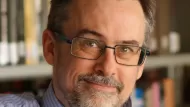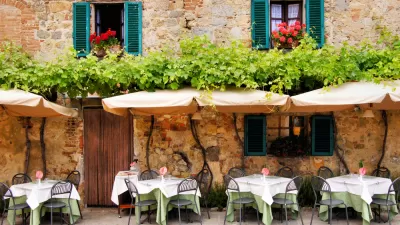When we think of cities in antiquity, we don’t hesitate to think of them in association with their respective civilizations. After all, the words civic and civilization share the same root word in Latin, civitas. Similarly, we can now say that we live in a globalized civilization largely structured on what author Jeb Brugmann refers to in his new book Welcome to the Urban Revolution as the global City. However, in our focus as planners on addressing concerns with current development projects and other local issues we might be forgiven for sometimes losing touch with this larger picture: that the city is still the focal point and driver for those processes we refer to as civilization.
When we think of cities in antiquity, we
don't hesitate to think of them in association with their respective
civilizations. After all, the words civic and civilization share
the same root word in Latin, civitas. Similarly, we can now say that we
live in a globalized civilization largely structured on what author Jeb
Brugmann refers to in his new book Welcome to the Urban Revolution as the global City.
However, in our focus as planners on
addressing concerns with current development projects and other local issues we
might be forgiven for sometimes losing touch with this larger picture: that the
city is still the focal point and driver for those processes we refer to as
civilization.
I was reminded of these connections last
week when I attended the 39th annual conference of the International
Society for the Comparative Study of Civilizations (ISCSC) in Kalamazoo Michigan. The Society was founded
in 1961 by a group of historians including the famed Arnold J. Toynbee. It is a
highly interdisciplinary organization that
is committed to the notion that complex,
civilizational problems need diverse, multidisciplinary analyses. Initially the
members of the Society came from history, anthropology, and sociology; now, the
Society includes such disciplines as philosophy, psychology, comparative
religions, economics, political theory, literary criticism and textual
analysis, art history, comparative government, comparative literature, science
and technology, linguistics, archaeology, architecture, geography, biology,
physics and ethnohistory.
(While urban planning isn't on this list,
the society once included amongst its prominent members the late Corinne
Lathrop Gilb, former Planning Director for the City of Detroit).
The theme of the conference was
Civilizations and Cultures in a Time of Change and Crisis
and it did not disappoint. The Society's President Dr. Andrew Targowsky gave a
keynote address setting out in deeply unsettling terms the environmental and
social challenges facing our global civilization. We have, he argued, managed
to avoid a "Malthusian Trap" through the use of technological efficiencies, but
are now facing what he calls a "Business Growth Trap" as the very forces which allowed the global population to escape its former
limitations now threatens our global ecosystems with
collapse.
Not all papers dealt with this
unfolding crisis directly, but many nonetheless made explicit the connections between cities and civilization. One of these focused on the contrasting views on cities held by two of the leading scholars
of civilization, Oswald Spengler and Arnold J. Toynbee. Spengler saw in the
emerging megalopolitan society all the deleterious forces of secular modernism,
including a deterioration of traditions and values and the ruination of rural
life. Toynbee by contrast was as dismissive of rural life as Spengler was of
the metropolis. Can the crisis of the modern metropolis be resolved by the
preservation of more traditional values?
This theme was taken up in another paper
discussing German conservative thought in the transition from the 19th
to the 20th Centuries: a rejection of city life and the industrial
revolution and a yearning for the continuity of a "volkish" rootedness in nature. In the same session another paper argued that, far from rejecting cities, we
need to recognize that they are going to be essential in our development of a
sustainable global civilization. Further, the leaders of this transition will
be true "global cities" – outward- and forward-looking cities where immigrants
and diversity are not only welcomed but integrated into all levels of society.
This is but a small sample of the papers. I
also presented a paper on planning and crisis (excerpted on my blog here and
here). Overall I was impressed with the multiplicity of viewpoints and the
attention paid by the scholars present to resolving some of the most pressing
issues of our time.
The ISCSC experience made me wonder to what
extent we as planners might be able to also adopt this larger picture: that we
aren't just planning cities, we are contributing to the planning of a
civilization, so as to ensure that it has a future. In this light, the call for
papers for the 2010 ISCSC conference at Bringham Young University -- Civilizational
Futures -- looks to be of particular interest to city planners.
See you in Provo?

Planetizen Federal Action Tracker
A weekly monitor of how Trump’s orders and actions are impacting planners and planning in America.

Maui's Vacation Rental Debate Turns Ugly
Verbal attacks, misinformation campaigns and fistfights plague a high-stakes debate to convert thousands of vacation rentals into long-term housing.

Restaurant Patios Were a Pandemic Win — Why Were They so Hard to Keep?
Social distancing requirements and changes in travel patterns prompted cities to pilot new uses for street and sidewalk space. Then it got complicated.

In California Battle of Housing vs. Environment, Housing Just Won
A new state law significantly limits the power of CEQA, an environmental review law that served as a powerful tool for blocking new development.

Boulder Eliminates Parking Minimums Citywide
Officials estimate the cost of building a single underground parking space at up to $100,000.

Orange County, Florida Adopts Largest US “Sprawl Repair” Code
The ‘Orange Code’ seeks to rectify decades of sprawl-inducing, car-oriented development.
Urban Design for Planners 1: Software Tools
This six-course series explores essential urban design concepts using open source software and equips planners with the tools they need to participate fully in the urban design process.
Planning for Universal Design
Learn the tools for implementing Universal Design in planning regulations.
Heyer Gruel & Associates PA
JM Goldson LLC
Custer County Colorado
City of Camden Redevelopment Agency
City of Astoria
Transportation Research & Education Center (TREC) at Portland State University
Jefferson Parish Government
Camden Redevelopment Agency
City of Claremont





























